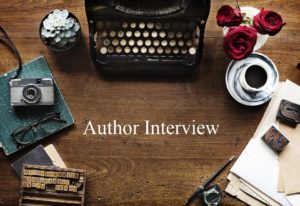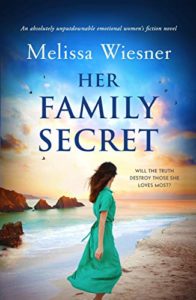An Interview with Melissa Wiesner
 2021 Debuts author Melissa Wiesner and I would not agree on the best time to write: “she’s a night-owl who began writing novels about five years ago when her early-to-bed family retired for the evening” while I’m an early-to-rise writer who started five years before she did. But we both agree on what to write about: love and relationships and possibility. Her debut novel, Her Family Secret, which launches today, has been called “an absolutely heartbreaking and emotional page-turner about the incredible strength of family bonds, how we can hurt those closest to us, and the healing power of love.” Melissa is no stranger to love, having won the 2019 RWA Golden Heart® Award in the Mainstream Fiction Category, and her second book, The Escape, features “a tentative friendship [that] blossoms into something more.” Like most everyone I interview, Melissa wears many hats: mother, wife, employee, author, marketer, and more. I’m thrilled she had time to chat with me about her work.
2021 Debuts author Melissa Wiesner and I would not agree on the best time to write: “she’s a night-owl who began writing novels about five years ago when her early-to-bed family retired for the evening” while I’m an early-to-rise writer who started five years before she did. But we both agree on what to write about: love and relationships and possibility. Her debut novel, Her Family Secret, which launches today, has been called “an absolutely heartbreaking and emotional page-turner about the incredible strength of family bonds, how we can hurt those closest to us, and the healing power of love.” Melissa is no stranger to love, having won the 2019 RWA Golden Heart® Award in the Mainstream Fiction Category, and her second book, The Escape, features “a tentative friendship [that] blossoms into something more.” Like most everyone I interview, Melissa wears many hats: mother, wife, employee, author, marketer, and more. I’m thrilled she had time to chat with me about her work.
Christina: Your debut novel, Her Family Secret, is out now. It’s beautifully written women’s fiction “about new beginnings and the healing power of love.” What inspired you to write the story?
Melissa: The setting probably came to me first, before anything else. In the fall of 2019, my family was invited to a wedding in the Pacific Northwest and our family decided to make a vacation out of the trip. My husband, two children, and I spent a lovely week winding our way north from Seattle to Bellingham, Washington, stopping to hike, explore the cliffs along the ocean, and search for wishing rocks on the shore. Six months later, when the world shut down due to the Covid-19 pandemic and I found myself locked down with my family, my mind was often drawn back to those pine forests, fields of wildflowers, and sunsets over the Puget sound.
From that, the story sort of fell into place. The cloudy, rain-soaked Pacific Northwest is such a moody, atmospheric location that it seemed the perfect place for Caleb, a brooding, reclusive artist to make his home. And then, of course, my main character, June arrives with her two kids and her sisters to bring the sunshine and light and inspiration that Caleb didn’t know he’d been missing.
Christina: Funny you should mention the setting! It definitely seems to be important to you. In Her Family Secret, thanks to your descriptions, I was right there in Wishing Cove. Do you naturally write setting easily, or is that something you explore on revision? What is your intent when you choose a particular setting?
Melissa: I studied film production in college, and as a filmmaker, I was a visual storyteller before I was a written one. When you write a screenplay, everything has to be shown through action, facial expressions, or dialogue. When I made the switch to writing novels, it was actually a learning curve for me to use thoughts, feelings, and internal dialogue in my books, because these tools aren’t available to screenwriters!
It’s still in my nature to visualize what a scene looks like as it plays out, almost as if a moviegoer were watching it. Setting, specifically, is so important for conveying the mood of a story. In movies, think of the camera panning across the dusty brown landscape in a Western film, or the disorienting darkness illuminated only by the explosion of bombs in a war movie. When reading my novels, I want you to feel that same sense of being dropped into a scene that you’d experience in a theater. To feel like you’re standing on the beach with the sea breeze blowing your hair, or driving across the desert with the sun warming your shoulders through the open window, right along with my characters.
Christina: The book features a family of artists. Do you paint? If not, what sort of research did you do to authenticate the story? If so, how did you decide what to include?
Melissa: Like my main character, June, I’m a former artist-turned-mom of two little kids, and I spent a decade and a half of my life working a “regular” job and neglecting my creative side. So, in a lot of ways, I rediscovered painting right along with June! Much of my research for this book was really just a matter of refreshing my memory of everything I’d learned about painting techniques and styles when I was younger. Also similar to June, I have a box of old art supplies shoved in a closet, and it was really fun to pull it out and rediscover the scents, colors, and textures of the brushes, oil pastels, and charcoals.
As far as what made it into the book, I wanted to include enough detail that June and Caleb’s art seemed authentic, but not so much that it would feel inaccessible to a non-artist. I’ve had a number of readers tell me they were inspired to go out and buy art supplies after reading, and that’s such a huge compliment.
Christina: Your second book, The Escape, is set to release in August. It, too, involves characters with secrets. What about secrets appeals to you and makes you want to write about them?
Melissa: After film school, I got my master’s degree in counseling, so I attribute my love of secrets in novels to the fact that I’m trained as a therapist. I might have a person share their story with me, but what I learn in early interactions is rarely what’s really going on. People have all sorts of layers that they use to hide and protect themselves. A therapist’s job is to slowly peel away those layers—I think of it like peeling an onion!—to find the real person or the real story beneath.
When I’m writing fiction, it feels very natural for my characters to have these same layers to their stories—troubled pasts and fears and insecurities that we have to peel away as their story to unfolds, so they (and we) can find their true selves.
Christina: By day you’re employed in the field of social work. What have you learned from the people you’ve met on a daily basis?
Melissa: One of the main tenets of social work is to practice from a strengths-based perspective. Social workers focus on the strength of people, communities, and their environment and not on their problems and dysfunctions. This strengths-based perspective is a concept I’ve leaned into in my writing. I’m not interested in telling stories of problems and dysfunction. Instead, I want to tell stories of strength, of resilience, of overcoming adversity. My characters may be knocked down again and again by hard times. But they will always pick themselves up and keep going.
Christina: What does literary success look like to you?
I’m a mother of two with a whole career outside of writing, and being an author is something I never imagined for myself when I was younger. So, at this point in my life, the fact that I get to write novels, and see them published, is the most wonderful and unexpected gift! Sure, I’d love to see my name on a bestseller list someday. Who wouldn’t? But for me, real success is having people discover my books, connect with my stories, and feel a range of emotions as they become invested in the lives of my characters.
Melissa can be found in multiple places!
Website: melissawiesner.com
Instagram: @melissawiesnerauthor
Twitter: @Melissa_Wiesner
Facebook: @MelissaWiesnerAuthor
Thanks to Melissa for agreeing to this interview! If you know of an author who’d like to be featured in an interview (or you are an author who would like to be featured), feel free to leave a comment or email me via my contact page.

